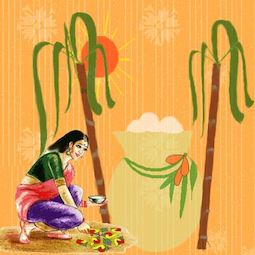India: Jesuits celebrate farmers' festival

Pongal Festival, Wiki Image Ben Israel
Inculturation opens the way for sharing the Gospel with people belonging to diverse cultures. Celebration of festivals of people is part and parcel of the life of missionaries. Jesuit formation pays close attention to inculturation for those in formation. One such instance could be witnessed in the celebration of the harvest festival in the Vidyajyoti Jesuit Community. As the month of December reminds us of the Christmas season and the coming of the Lord as the light of the world, the month of January reminds the people of India of the end of winter days and the beginning of summer. The Sun makes a move from the southern hemisphere to the northern hemisphere. For the people who live in tropical countries like India, the movement of the Sun brings new hope and a new future in their lives. This harvest festival is also celebrated as Lohri, Makar Sankranti, Bhogali Bihu, Uttarayan and Paush Parva.
All these above festivals are linked in the celebration of Pongal with our Tamil brothers and sisters. Pongal celebration is very much associated with farmers and their joy in labouring to bring forth a plentiful harvest. As a festival of thanksgiving, the Pongal celebration is a moment, for farmers to express their gratitude to the Sun and the cattle, all human persons to the farmers for the richer harvest, all living beings to the Sun and the Earth, and finally the mother Earth to her creator for having once again enabled her to be fertile and feed her little ones in her womb. In a way, it is a cosmic festival to thank one another for enriching life on this Earth. The Pongal celebration is also a festival of the beginning of new dawn marked with a new pot, new rice, new sugarcane, and new fire to welcome the new day of the Tamil month 'Thai'.
For Jesuits, celebrating this farmers' festival is to enter into the realisation of the farmers that themselves and their hard labour alone are not sufficient for the harvest in abundance, rather they need the labour assistance of animals, partnership of neighbours in their endeavour. As labourers in God's vineyard, Jesuits make a family with all those who work with them. As administrators of God's mission, they need others' support and networking to carry out the mission. For them, this celebration is also a call for a universal mission. It is because, in today's context, the green revolution has chased away the microbiomes from the land. The machinery revolution has replaced cattle with tractors and machines. Now the corporate revolution attempts to replace farmers with companies.
Stretching today's context, a little further, the rationale behind Green Revolution is to get a plentiful harvest at all costs using pesticides. One way, this rationale has led to more chemical use toxifying the land and food. On the other way, it has led to the attitude of being easy-going, seeking immediate results and being content with ready-made solutions that are gripping the youth of our nation today. Similarly, desiring farming without farmers and making anti-farmer policies portray the hidden attitude of desiring one India without its multiplicity in religion, culture, and language. Since the harvest is still plentiful to detoxify our anti-nature attitude, this celebration puts Jesuits on their knees to pray earnestly to the Lord of the labourers, and put their shoulders together for a cosmic union.
Lawrence Arockiasamy belongs to Jesuit Madurai Province, Tamil Nadu, studying theology at Vidyajyoti College, Delhi. He is interested in social concerns and works for the upliftment of the marginalised.


















